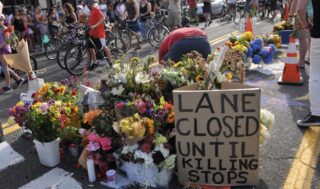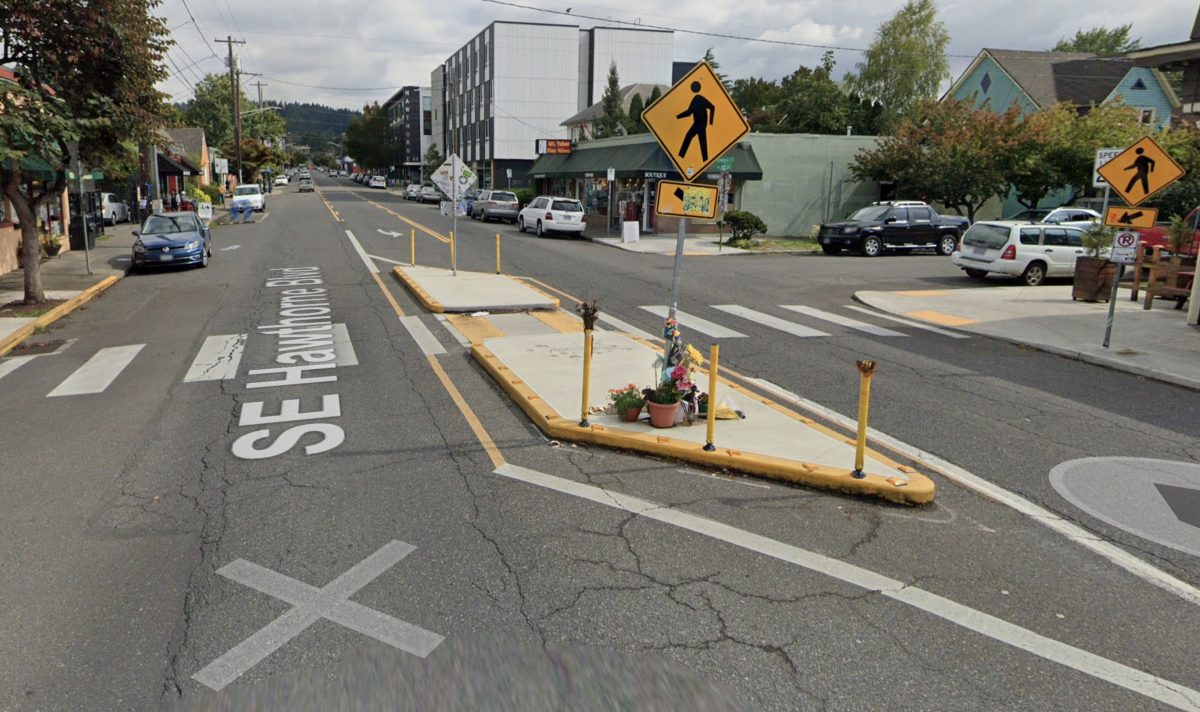
(Photo: J. Maus/BikePortland)
The family of a 15-year-old Cleveland High School student who was killed while crossing Southeast Hawthorne Boulevard in 2016 will be paid $395,000 by the City of Portland. The settlement comes from a lawsuit filed by the Estate of Fallon Smart. The suit alleged wrongful death and negligence from the Portland Bureau of Transportation based on conditions at the intersection of Hawthorne and SE 43rd.
The tragic death of this young Portlander and the maddening circumstances surrounding the man who killed her are blights our city will never fully recover from; but this relatively rare and large payment by PBOT could be a positive sign that road agencies will take more responsibility to keep our streets safe.
In August 2016 Smart was struck and killed at that intersection by Abdulrahman Noorah as he sped recklessly down Hawthorne. Noorah was never brought to justice and The Oregonian reported he escaped house arrest with help from the Saudi Arabian government.
The location where Smart was killed had been a source of concern for years from local residents and business owners. Despite being a popular commercial corridor, there were no marked crosswalks and the area was known to be a hot-spot for speeding. Seven months after the tragedy occurred, PBOT installed a painted crosswalk and raised center median island. They also reduced the speed limit from 25 to 20 mph.

Portland lawyer and safe streets activist Scott Kocher, who’s litigated similar cases himself, says the settlement is, “a big deal.” “As tragic as this situation is and as incomplete as the justice is, I think it’s an important result for everyone to take note of.”
Advertisement
“I believe the legal trend is following the social trend, which is to say that road injuries and deaths are out of control and transportation agencies actually have a part in that.”
— Scott Kocher, Forum Law Group
Historically it’s been very rare for government agencies and road authorities to be found liable for the unsafe condition of their streets. Under a sweeping legal concept known as “discretionary immunity” laws and the courts all but shielded government from responsibility. “There’s always been this fascinating question,” Kocher said in an interview today. “Where do you draw the line between a very dangerous roadway a city knows to be unsafe, versus making them fix every pothole immediately.”
In Kocher’s view, initiatives like Vision Zero and a growing urgency and awareness for safe streets in general, are finally catching up to the legal system. “The implication of vision zero is that you don’t just give the road authority a free pass for anything and everything, you view them as a proprietor of a place just as you’d view a hotel owner as proper of a hotel. If a hotel has rickety old railing, you can’t blame a user for falling on it. It’s the same if you’re a road authority and you know people are going 40-plus mph on Hawthorne past a bunch of cute little shops… at some point you’ve got to do something.”
“I believe the legal trend is following the social trend,” Kocher continued, “which is to say that road injuries and deaths are out of control and transportation agencies actually have a part in that.”
$395,000 is the largest amount Kocher has seen in a case like this. The fact that the City of Portland was willing to pay out this much means they felt a judge and jury would agree with the lawyer representing the Estate of Fallon Smart. He thinks it could have, “A ripple effect through agency decision making.”
Portland City Council will make the settlement official at their meeting tomorrow.
— Jonathan Maus: (503) 706-8804, @jonathan_maus on Twitter and jonathan@bikeportland.org
— Get our headlines delivered to your inbox.
— Support this independent community media outlet with a one-time contribution or monthly subscription.

